Julie Musil's Blog, page 2
July 15, 2015
Hope, Pride, and Midway Blues
 (yours truly)
(yours truly)Last week, my 15-year-old sons and I took beginner tennis lessons. It was a fun but challenging week. We learned new skills such as forehand, backhand, volley, and serve. We felt muscles we didn't know existed.
As we progressed through the week, I experienced the same emotions I experience with each new writing endeavor:
Hope
On the morning of our first lesson, as we learned simple things, I was hopeful for what the week would bring. I imagined my skills growing each day, and how much fun my sons and I would have when we conquered the tennis court. Heck, with a cute tennis skirt and a visor, what could go wrong? I was an eager student.
When I first began writing seriously, I was also hopeful. I marinated in each new writing skill, knowing I was working my way toward something important. With each writing project, I open a fresh document with high hopes and great expectancy.
Midway Blues
By the middle of our tennis lessons, I became discouraged. As the coach increased the level of difficulty, I experienced the whole "one step forward, two steps back" thing. As each new skill was taught, I struggled to remember the skills from previous lessons. I wondered why in the heck I fooled myself into thinking I could learn a new sport. I envied my sons, who are super athletic and learn such things easily.
Same with each writing project, and with my writing journey as a whole. With each new project, I reach a point when I feel discouraged and wonder how I'd ever had that initial jolt of courage. I struggle to remember each lesson I've learned, trying to perfect this skill and that technique. How did I ever think I could conquer such tasks as writing a full-length novel?
Suck it Up and Move On
During tennis, right after a brief pity party, I had to suck it up and move on. I realized I was not going to become a Williams sister in the course of one week. I learned what I could, knowing it would take practice, practice, practice. I could either focus on all I was doing wrong, or on all I'd learned in a short period of time.
Same with writing. When we hit a wall, sometimes we just have to suck it up and move on. We can't stifle our creative momentum by sulking about all we're doing wrong. We can rejoice in what we've done right, knowing we still need to practice, practice, practice.
Pride
At the end of our tennis camp, I was proud of all we'd accomplished. As our coach pointed out, we had a basic knowledge of how the sport worked. Now we could bang a few balls around the court. We had a foundation to work with. Were we skilled in the sport? Well, more than we'd been at the beginning of the week. We'd taken on the challenge of learning something new. We'd put our hearts into the lessons, and shared a lot of laughs.
With each writing project, I feel pride at several stages. Proud of the original idea. Proud of the perseverance through doubts and insecurities. Proud of the finished product. We writers should feel proud of what we accomplish, while acknowledging there's still so much to learn.
Do you experience these same emotions when writing? Have you learned a new sport or skill lately? Ever played tennis?
Published on July 15, 2015 04:00
July 8, 2015
The Law of Happiness--A Book Review

Instead of my normal "writing lessons learned" post, today I'll share a book with you that teaches life lessons. It's called The Law of Happiness by Dr. Henry Cloud.
I've been reading a lot of nonfiction lately, and this book fascinated me. Why? It's a book where the Bible and science collide. I'm not a scientific person--I'd say I'm more spiritual--but that doesn't mean I don't have questions about how the two coexist.
What I loved most about this book was how it gave scientific proof for how the truths found in the Bible make people happy. It showed how if we followed the advice given in those ancient pages, we are following a path that's paved with happiness. Life will always have troubles, to be sure, but it's nice to know there's a proven guide for how to keep joy in our lives.
Without giving too much away, let me list three laws of happiness. And since this is a writing blog, I'll even point out how these laws apply to writers!
Happy people are givers. It's true that giving brings much more joy than receiving. This truth applies when giving tithes at church, or giving clothes to the local homeless shelter. But it's also true when writers give their time to help other writers, or give a kind word to someone who's ready to give up. Giving doesn't have to be expensive. Encouragement is free.Happy people connect. It's great when we connect with others in the physical world, and also when we connect with each other virtually. If we're ever feeling alone out here in our little corner of the world, all we have to do is reach out to a fellow writer. They'll know exactly how we're feeling. When we're tempted to isolate ourselves, reaching out is a great way to add joy to our lives.Happy people don't compare themselves. This is a biggie for writers, yes? Sometimes it's difficult to not compare ourselves. But...you see that writer over there? The one with the accolades and the book deals and the mega sales? He's on his path and you're on yours. We were each given special gifts that make our stories and writing styles our own. My sentences and word choices will be different than yours. My publishing path will be like no other. Same with you. We each bring something unique to the literary world--let's not compare ourselves to others.These three laws are just a sampling of the wonderful laws of happiness outlined in this book. I highly recommend it. Not only as a writer, but as a flawed person who's figuring out this thing called Life. The beauty of The Law of Happiness is that it's not all about religion. Sure, it's about laws written in the Bible, but it's also about how science backs up those same theories. If you're looking for a lamp to guide your path, this book is a great place to start.
If smiles were like star ratings, I'd give it five smiles :) :) :) :) :)
Have you read The Law of Happiness? Are you curious about how science and the Bible collide? Do you feel happiness when you give, connect with others, and toss aside comparisons? What else makes you happy?
Published on July 08, 2015 04:00
July 1, 2015
Mini Writing Retreat #IWSG
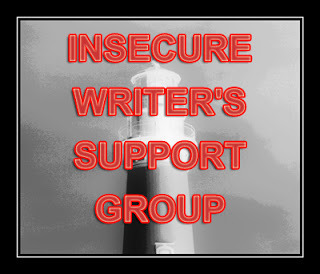
Welcome, Insecure Writers! Not a member of this group yet? Remedy that STAT!
I'm currently on a mini writing retreat with two of my closest writing buddies. How is it going? I'll report back later! But I did want to chat abut a couple of things. Writing retreats can be expensive and inconvenient--especially if you're on a tight budget and have little kids at home. I'm not one to dump a lot of money into the writing process. It's just not my style. But when my friends approached me with the mini retreat idea, I jumped on board. Why?
Lower cost. We're not paying for expensive workshops or roundtable critiques. We're simply getting away with our laptops to write. Most of the stuff covered in workshops or retreats can be found online for free.Zero pressure. I don't feel the pressure of passing my manuscript around to strangers. I don't feel pressure to come back to the hotel room between sessions in order to slash and burn my manuscript. It's simply a quiet time to work with friends who are doing the same thing.Friendly motivation. Part of the benefits of a retreat is the camaraderie between writers, and the knowledge gained from pros in the field. We can get enough info from pros in the field without spending the equivalent of a family vacation budget. And by meeting with like-minded friends, we can motivate each other to stay on task.Retreats and conferences have never been my cup of tea, but this mini retreat idea might be something I can warm up to.
Have you ever attended a writing retreat? A big writing conference? What was your impression? Would you prefer a mini writing retreat? Please share!
Published on July 01, 2015 04:00
June 24, 2015
Excuses and Motivation
 photo credit
photo creditConfession time! Besides blog posts and journal entries, I haven't written anything in over a month. A month! My editor returned her notes to me right after Memorial Day weekend, and I haven't even opened the document. I feel as if spider webs are growing on my laptop.
*sigh*
At first I came up with loads of excuses...my son's graduation, end of school year banquets, hosting a swim party with 35 freshmen. My list of excuses was looooong. But really, there are no excuses. I just haven't been motivated.
But! I'm going on a mini writing retreat with a couple of friends soon, and I'm looking forward to quiet time to open up that document and get back to work. I'm motivated to be motivated :)
In honor of my long list of excuses, and my desire to motivate myself to be motivated, I'll share some quotes with you:
Excuses
"Excuses are the nails used to build a house of failure." -- Don Wilder and Bill Rechin (ouch!)
"There is always a perfectly good excuse, always a reason not to. The hardest freedom to win is the freedom from one's excuses." -- Robert Brault
"You can make excuses or you can get the job done, but you can't do both." -- Hap Holmstead, The Biggest Loser
Motivation
"Ability is what you're capable of doing. Motivation determines what you do. Attitude determines how well you do it." -- Lou Holtz
"Motivation will almost always beat mere talent." -- Norman Ralph Augustine
"People often say that motivation doesn't last. Well, neither does bathing--that's why we recommend it daily." -- Zig Ziglar
Have you been consistently writing? Or are you like me, and haven't opened a document in a while? Do you have a long list of excuses? Are you sufficiently motivated? Please share!
Published on June 24, 2015 04:00
June 17, 2015
The Opposite of Envy

I was listening to a podcast interview with Dr. Henry Cloud, author of The Law of Happiness. I'm reading this book now. I'll report back later.
Anyway, in the interview Dr. Cloud spoke about how gratitude is the opposite of envy. Sounds weird, but I've never thought of it that way. But it makes sense. With envy, we're upset about what we don't have. With gratitude, we're thankful for what we do have.
A fun illustration of this is a tweet that was sent out by my son, who graduated from high school last night. He was bidding a fond farewell to his school. "No more FIFA tournaments, no more cafeteria food, no more expired ASB snacks, no more dirt-covered trailers. I'm going to miss everything."
You see, his high school is a small cluster of trailers surrounded by dirt countryside. A new high school is under construction, but that didn't matter to my son. In a quote he gave at a scholarship luncheon, "The guts are good, even if it isn't pretty on the outside." He isn't envious of kids who go to fancy schools. He excelled and had a blast in dusty trailers, knowing he was blessed with education and a small town atmosphere. In my opinion, that's a heart of gratitude.
The topic of envy reminded me how we writers can be afflicted by the Green Eyed Monster just as much as, or maybe more than, the next guy. Book deals, large advances, bestseller status, signing with a top agency--these highlights sometimes seem to only happen to other writers.
Today I encourage all of us to practice the opposite of envy. Let's express gratitude for what we currently have in our writing lives:
The ability to readThe ability to spellThe ability to writeThe ability to tell storiesThe ability to write on a computerThe ability to cut and pasteThe ability to send queries via emailThe ability to download ebooks instantlyThe ability to publish instantly
As my son closes the chapter on high school and begins the next chapter at a university, I'm thankful for his heart of gratitude. And when the Green Eyed Monster sneaks up on us, we can list the good things in our writing lives. The cure for envy is gratitude.
Anything else you'd like to add to the above list? Do you ever get bitten by the Green Eyed Monster? How do you handle it? And if you haven't yet seen it, check out my IWSG post about our Wall of Gratitude.
Published on June 17, 2015 04:00
June 10, 2015
Criticism = Free Coaching
 (photo credit)
(photo credit)criticize |ˈkritəˌsīz| verb [ with obj. ] 1 indicate the faults of (someone or something) in a disapproving way2 form and express a sophisticated judgment of (a literary or artistic work)
I was listening to a podcast by Joyce Meyer about criticism. Not literary criticism, but other criticisms we may receive in daily life.
Criticism is tough to take, especially if it isn't given nicely. But Joyce Meyer made a great point: criticism, if given in good faith and with kindness, is like free coaching.
That really resonated with me.
I thought of it this way: when my kids do something wrong and I gently correct them (not criticize them negatively), I'm coaching them on how to be decent human beings. Just like my mom used to coach my siblings and me on how to watch our language and do the right thing.
As writers, we're subject to literary criticism all the time. First with our early readers, then with agents and editors, and finally with readers.
Here are my thoughts on how literary criticism can be effective as free coaching:
Is the review/critique given with good intentions? Is the criticism just mean? Is there any meat behind it, or is it just harsh words slung out there to demoralize? If criticism is given with the intention to help the writer, it can be received as free coaching.Is the review/critique given with respect? Is the critic using respectful words? Tone?Does the critic understand the difficulty of having their work criticized? Writers know how difficult it is to have our work filleted and gutted by others. The writers who've criticized my work (at my request!) have all understood how it felt to have their work critiqued. Their ideas were given with respect.Can the critic offer a better way to approach the problem? One of my favorite things about having my work critiqued is the back and forth that takes place with my beta readers. One might highlight a section because it bothered her. She'll explain why it stood out to her, but she won't stop there. She'll offer ideas on how to fix the problem. How I handle it is up to me, but I truly appreciate the brainstorming.Is the writer coachable? If we feel as if we know it all, forget about it--we won't learn a thing. If we feel as if our writing is above criticism, forget about it--we'll struggle to grow. In real life, and in the writing life, it's important to remain coachable. There's always something new to learn.Sometimes our greatest growth takes place when we offer ourselves up for criticism. For this "free coaching" to really be effective, it's important that we're open to alternative opinions and new ideas. And we must remember that it's our work being critiqued and reviewed, not us as writers. Those lines become blurry at times, yes?
How do you handle criticism, in daily life and in your writing life? Can you list any other ways that criticism can be viewed as free coaching? Any tips you can offer on how to remain coachable?
Published on June 10, 2015 04:00
June 3, 2015
Wall of Gratitude #IWSG
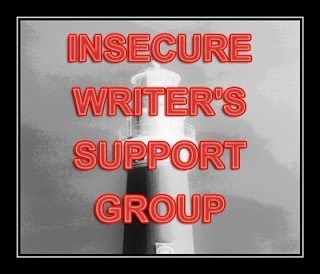
Welcome, Insecure Writers! If you haven't yet joined this amazing group, head on over to the site and sign up. You'll be thankful you did.
On the subject of being thankful, we have a new addition in our home. No, it's not a new baby, or another rescued pet. We have a wall of gratitude.
I can't take credit for the idea, though. Our pastor spoke about how gratitude is on the path to joy, and if we put up visual reminders of what we're thankful for, it'll remind us of the blessings in our lives. So we created a wall of gratitude on our fridge.
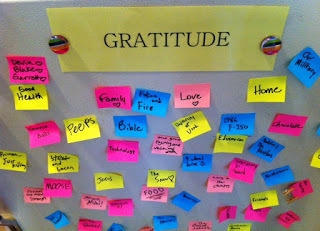 (cute, yes?)
(cute, yes?)Our boys have the freedom to write whatever it is they're thankful for. They're teens, so of course they've written things like steak, vanilla shakes, and pizza. But they've also written family, our military, and an education. I've written God, good health, and love.
But of course the writer in me is evident on that wall. I've added books, words, the skills and desire to write, perseverance, and positive attitude.
Whenever I'm feeling low, I stroll over to that wall and read all that we're thankful for. And I won't leave without adding something new. That simple task makes me feel lighter. Our pastor is right...gratitude is definitely a big part of the path to joy.
Do you have a wall of gratitude? Or a gratitude journal? If you're ever feeling low, do you focus on what's wrong, or do you focus on what's right? What are you thankful for today?
Published on June 03, 2015 04:00
May 27, 2015
When Words Aren't Enough
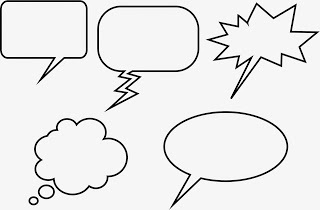
photo credit
Sometimes words aren't enough. Even for a writer.
My family spent the past weekend at a sports camp for burn survivors and their families. You see, my fifteen year old son is a burn survivor himself. Once you're treated at the Grossman Burn Center, you're a part of their family.
In the early days after my son's burn, I used to hide our invitation to burn camp. My reasons were entirely selfish. I didn't want to spend time with other burn survivors and their families--my son's physical wounds, and my mommy guilt wounds--were way too fresh.
Once my sons were older, I finally shared the invitation with them. Of course they were all over it, and now look forward to burn camp each year.
Funny thing is? I also look forward to it now. Spending time with other burn survivors and their families is the real joy of burn camp.
While at camp, I experienced such gratitude. I'm thankful for the other survivors and their families, who share the unique issues that burn survivors go through. I appreciate that kids and adults alike can walk around with their scars fully exposed, and know that they'll be accepted. I appreciate the open mic sessions after meals, where folks stand up and share how they were burned, and how burn camp has helped them heal.
During the weekend, I often thought about how I could write what camp meant to me, and what the fellowship with other families meant to our family. But the harder I tried to put it into words, the more frustrated I became. Because really, sometimes words aren't enough.
Instead, I set aside my writer brain and simply basked in the emotional journey of burn camp. I stopped trying to find the right words to express what it meant to me, and simply soaked it all in--the healing, the safety, the scars that no one paid attention to.
Here's what I'm learning: sometimes it's therapeutic to write about whatever junk we're going through. I even wrote a post about Writing Through Painful Memories. But sometimes it's ok to just revel in the moment and not be a writer.
What say you, writer friends? Do you ever have moments you've tried to put into words and can't? Do you ever set the writer brain aside and just live in the moment? What moments had such an impact on you? Please share!
Published on May 27, 2015 04:00
May 20, 2015
You're the Star of Your Publishing Movie

Quick note! I guest posted over at Adventures in YA Publishing about Creative Stage vs. Analytical Stage. Come check it out and say Hi!
Now on with the regular post...
Imagine this: You're watching a movie. You yawn because everything is going the main character's way. She never experiences conflict. She doesn't encounter a villain or a personal obstacle. She never makes mistakes, and the ending is predictably happy.
Boring!
Now, imagine this: You're watching a fabulous movie, gasping at the twists, biting your nails when the main character is in a pickle, laughing at the goofy choices she makes, and clapping as the final credits roll.
Better, right? Except when that movie is about our own publishing journey. We'd like to do without the twists, pickles, and goofy choices, thank you very much.
But what if you knew the ending to your publishing movie? What if you knew that the main character--YOU--would victoriously conquer the story goals? Would you have less anxiety? Would you worry less? Would you calmly move from one scene to the next, knowing it would be okay?
I'm here to tell you it'll be okay. How do I know? Because your story isn't over yet. When you encounter frustration in your own publishing movie, try this:
Embrace the Ups and Downs
Each rejection may seem like an obstacle, but it's really a stepping stone. Each request for a partial or full, or each yes from an editor or agent, is a stepping stone as well. Embrace them. They're all part of the journey.
Do What Your Character Would Do
Do you want your main character to snivel? Hide? Back down against the slightest push back? No! you want her to figure out a solution. You want her to fight back. You want her to conquer fears. You want her to learn from her mistakes and then get out there and make fresh mistakes.
Be a comeback kid
In movies, and in books, there's usually an "all is lost" moment. Perhaps you've had one or more of those moments in your own publishing journey. But remember this: usually that "all is lost" moment is right before the character triumphs. Get back up again. Come back strong. All is NOT lost. Your story is not yet over.
Movies with zero conflict are boring. Your publishing movie is not boring at all. When you reach the conclusion, you'll be satisfied because it didn't come easily. You fought against obstacles and internal villains, and wrote your own happy ending.
Have you ever considered your publishing journey as your own personal movie, with you as the main character? Are you the kick-bootie lead? Are you glad your movie is full of twists and turns, or do you wish your path was a little straighter?
Published on May 20, 2015 04:00
May 13, 2015
The Changing Face of YA Literature
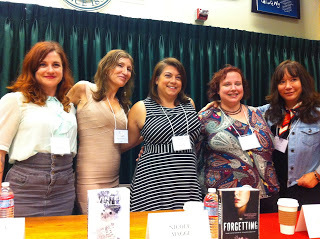
Last weekend I was so excited to see my good writer buddy, Lisa Gail Green--author of Soul Crossed, participate in an author panel at Vroman's Bookstore in Pasadena. That bookstore is such a blast! I could've spent the whole day in there.
Anyway, the topic of Lisa's panel was "The Changing Face of YA Literature." Other authors on the panel were Francesca Lia Block, Lissa Price, and Nicole Maggi. It was moderated by Erika Jelinek.
I took a few notes during the discussion. The authors gave really good answers to timely topics. Here's a short summary:
Research shows that about 50% of YA books are read by adults. The authors were asked, "Does this change the way you write?"
Lisa Gail Green--No, it doesn't change the way she writes (thank goodness!). She tells the story that needs to be told. YA writers can be fearless with their choices of topics.
The authors were asked why they think older readers like to read YA books?
Nicole Maggi--Voice. YA books are often about misunderstood teens. These stories take adult readers back to that tumultuous time. It reminds us of what it was like escape into our favorite books.
How do these authors tap in to an authentic teen voice?
Lisa Gail Green--she uses her acting background to insert herself into the role of her characters. She tackles the types of problems real teens face--problems that seem bigger than life, with high drama and strong emotions.
What makes YA books so appealing?
Nicole Maggi--many teens want to be normal, but wouldn't it be cool if they were called to be a super hero? Most people wish they were extraordinary in real life. But if we were called to do that, would we? YA books explore the possibilities.
Diversity in YA books...
Lissa Price--she pointed out that it would be great if the characters' faces in YA books better reflected the faces in the classroom.
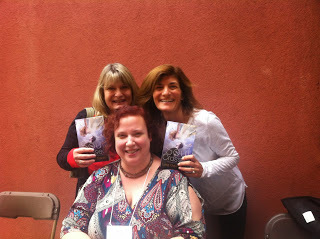 (Leslie Rose, Lisa Gail Green, and yours truly)
(Leslie Rose, Lisa Gail Green, and yours truly)There was so much great information packed in the short amount of time, and I only scratched the surface. Be sure to click on the author links above. They had some amazing books on display.
What do you think of this topic? What's your opinion on the changing face of YA literature? Or literature and publishing in general?
Published on May 13, 2015 04:00



